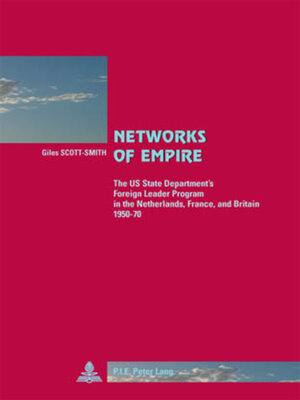Networks of Empire
ebook ∣ The US State Departments Foreign Leader Program in the Netherlands, France, and Britain 195070 · Cité Européenne / European Policy
By Pascaline Winand

Sign up to save your library
With an OverDrive account, you can save your favorite libraries for at-a-glance information about availability. Find out more about OverDrive accounts.
Find this title in Libby, the library reading app by OverDrive.



Search for a digital library with this title
Title found at these libraries:
| Library Name | Distance |
|---|---|
| Loading... |
Exchange programmes have been a part of US foreign relations since the nineteenth century, but it was only during and after World War II that they were applied by the US government on a large scale to influence foreign publics in support of strategic objectives.
This book looks at the background, organisation, and goals of the Department of State's most prestigious activity in this field, the Foreign Leader Program. The Program (still running as the International Visitor Leadership Program) enabled US Embassies to select and invite talented, influential 'opinion leaders' to visit the United States, meet their professional counterparts, and gain a broad understanding of American attitudes and opinions from around the country.
By tracking the operation of the Program in three key transatlantic allies of the United States a full picture is given of who was selected and why, and how the target groups changed over time in line with a developing US-European relationship. The book therefore takes a unique in-depth look at the importance of exchanges for the extension of US 'informal empire' and the maintenance of the transatlantic alliance during the Cold War.
This book looks at the background, organisation, and goals of the Department of State's most prestigious activity in this field, the Foreign Leader Program. The Program (still running as the International Visitor Leadership Program) enabled US Embassies to select and invite talented, influential 'opinion leaders' to visit the United States, meet their professional counterparts, and gain a broad understanding of American attitudes and opinions from around the country.
By tracking the operation of the Program in three key transatlantic allies of the United States a full picture is given of who was selected and why, and how the target groups changed over time in line with a developing US-European relationship. The book therefore takes a unique in-depth look at the importance of exchanges for the extension of US 'informal empire' and the maintenance of the transatlantic alliance during the Cold War.







